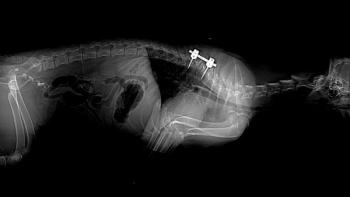
- dvm360 November 2019
- Volume 50
- Issue 11
Study applies human autoimmune encephalitis research to canine condition
Veterinary researchers from North Carolina State University investigate whether antibodies play a role in etiology of poorly understood disease.
Results of a new study from North Carolina State University reveal that dogs suffer from the same type of autoimmune encephalitis as humans, according to a release from the College of Veterinary Medicine. The study's findings, just published in the
“Being able to show that dogs suffer from a specific autoimmune encephalitis is really a paradigm shift,” says Natasha Olby, MB, PhD, MRCVS, DACVIM, one of the study authors and professor of veterinary neurology at North Carolina State. “While treatment options will remain the same, we can now look for more antibody targets and perhaps be able to change the diagnosis from ‘unknown etiology' to a diagnosis by neuronal cell surface target.”
A hard-to-treat condition
Autoimmune encephalitis, an immune system reaction against the brain, is challenging to treat in dogs. In fact, veterinary neurologists have been unable to differentiate between the large numbers of non-infectious cases, referring to them as “meningoencephalitis of unknown etiology.”
“When we diagnose encephalitis based on MRI and spinal tap, we run infectious disease testing. If we rule out infection (which accounts for only a small portion of these cases), we are left with a diagnosis of meningoencephalitis of unknown etiology. This is an umbrella term for autoimmune encephalitis, and we treat these dogs with immunosuppression,” Dr. Olby says.
In human medicine, researchers have a better grasp on autoimmune encephalitis. This is largely because of the discovery of antibodies to different surface proteins on neurons found in people with encephalitis. N-methyl-D-aspartate (NMDA) receptor encephalitis, in which there are antibodies to the excitatory NMDA receptor, is the most common. Now even more of these surface protein targets have been identified, each associated with a different form of autoimmune encephalitis, according to the release.
“In reality, there are likely to be many different forms of autoimmune encephalitis in which the immune system is reacting to different targets within the brain. Currently, we are unable to distinguish these in the living patient. While we treat all the cases with immunosuppression, better categorization of the different forms of encephalitis might enable us to predict prognosis better and fine-tune treatment for different diseases,” Dr. Olby says.
Screening for antibodies
Dr. Olby and her team used a test that screens for antibodies against six different neuronal surface targets involved with autoimmune encephalitis in humans to test the cerebrospinal fluid (CSF) from dogs with encephalitis. Human and canine genes for these targets are practically identical, which is why a human test works effectively for dogs, the release indicates.
“The test contains cells that express the human target proteins at high levels and if there are antibodies to these targets in the CSF, they will bind to the cells and we can visualize them with a fluorescent tag,” Dr. Olby says.
Finally, the researchers screened CSF banked from 32 dogs with both inflammatory and non-inflammatory neurological disease.
Study results may lead to improved treatment options
Nineteen of the 32 dogs screened were diagnosed with inflammatory disease, of which three were positive for antibodies to the NMDA receptor target. All three dogs responded well to immunosuppressive therapy, the researchers say.
“Being able to categorize the disease more accurately may give both dogs and humans more options for treatments in the future,” Dr. Olby says.
The researchers conclude that “further evaluation of the prevalence and clinical relevance of CSF and serum antibodies to neuronal cell surface antigens is warranted.”
Articles in this issue
about 6 years ago
Slow down, Billy!about 6 years ago
Predictive diagnostic RenalTech now availableabout 6 years ago
The ABCs of veterinary dentistry: T is for treatmentabout 6 years ago
Zoetis to veterinary students: We want to give you $2,000about 6 years ago
Hills goes small: nutrition center expansion to focus on petite pupsNewsletter
From exam room tips to practice management insights, get trusted veterinary news delivered straight to your inbox—subscribe to dvm360.





